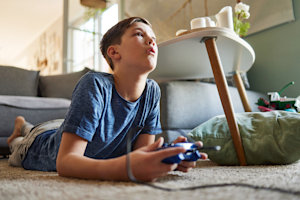
Digital wellness
Celebrating Media Literacy Week: Media Stamped wins international recognition
Award-winning digital literacy resources now available to Canadian educators.
Read article
Nimmi Kanji
Director - Social Purpose Programs, For Good and TELUS Wise

This New Year marks the start of the 2020’s. With self-care a priority for so many of us, the new decade is the perfect time to resolve to step it up. The good news? Technology can help us see our resolutions through.
Canada Health Infoway wanted to understand how Canadians were using mobile apps and smart devices to monitor health and wellbeing. The organization surveyed approximately 4,100 Canadians and published its findings in the study, Diffusion of mobile health apps and smart connected devices in Canada. It was the first national study of its kind in Canada, and the largest ever globally. According to the study, 32% of Canadian adults use one or more mobile apps to monitor aspects of their health, and approximately one in four Canadian adults (24%) owns at least one smart device for health and wellbeing.
With more than 320,000 health and fitness apps available in major app stores, how do you choose? It depends on your goals and your personal health situation. Whether you want to improve your nutrition, amp up your fitness routine, sleep better, be more mindful or take a break from technology (ironic, but nowadays managing screen time and tech use is a critical part of our self-care), we’ve rounded up some of the most popular apps to get you started and keep you accountable.
Keto. Intermittent fasting. Paleo. Vegan. Regardless of your nutrition philosophy, many people find using apps for information and tracking extremely valuable. These apps can help:
Want to train at home? Looking to try the hottest class in your area? Bored of your tried and true running route? These apps may be for you.
It seems like a simple thing, but according to Dr. Ram Randhawa, a psychiatrist at the University of British Columbia's Sleep Disorders Program, approximately 30% of Canadians struggle with getting to or staying asleep at any given time. Apps can help you get the much-needed rest you may be craving – whether it’s helping prepare you for a good night’s sleep or tracking your sleep quality.
With our always-on culture at all-time high, quieting the mind is at the top of many people’s self-care resolutions lists. Both of the apps mentioned below are on Statista’s list of leading iPhone health and fitness apps in Canada 2019.
Sometimes disconnecting is what’s best for our self-care – mentally, emotionally and physically. It’s healthy to take a proactive break from the bings and dings, as well as limiting the dopamine release that comes with social interaction and validation. In addition to using apps and/or features available on your device (like iPhone’s Screen Time feature), here are some other apps that can help:
If the thought of using an app for digital detox seems contradictory to you, try to incorporate these strategies into your daily device use:
Check out the TELUS Wise tip sheet, Managing Screens in your Home, for more ideas on helping your family achieve better balance.
Whatever your goals are for 2020 – self-care or otherwise – we hope you achieve them and discover productive yet safe ways to incorporate technology into your journey.
From all of us at TELUS Wise, wishing you a happy, healthy and digitally safe 2020.

Award-winning digital literacy resources now available to Canadian educators.
Read article
Learn how gaming and gambling features blur for kids.
Read articleLearn how screen time triggers dopamine responses. Students explore digital media's biological impact and develop healthier digital habits.
Watch video